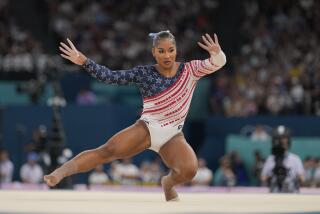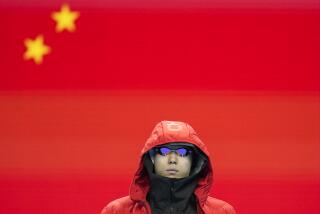Steroid Secrecy Upsets IOC
- Share via
USA Track & Field officials have not explained why gold medalist Jerome Young was cleared to run in the 2000 Sydney Olympics after having tested positive the year before for a banned steroid, International Olympic Committee President Jacques Rogge said Monday.
“I’m disappointed,” Rogge said.
For the record:
12:00 a.m. Dec. 5, 2003 For The Record
Los Angeles Times Friday December 05, 2003 Home Edition Main News Part A Page 2 National Desk 1 inches; 38 words Type of Material: Correction
Olympics -- An article Tuesday in Sports about the steroid issue involving USA Track & Field and the International Olympic Committee included several quotes from IOC President Jacques Rogge. The quotes should have been attributed to Associated Press.
The IOC has begun an inquiry into whether Young and the others on the winning U.S. 1,600-meter relay team should be stripped of their medals. The matter is high on the agenda of the IOC’s ruling executive board meeting later this week in Lausanne, Switzerland.
The case has soured U.S. relations with the IOC and other Olympic sports officials. It has also become a sticking point between USATF and the U.S. Olympic Committee, with the USOC threatening USATF with sanctions, including the loss of USATF’s status as the U.S. governing body for track and field. “We do not have today the full information,” Rogge said Monday. “We need better information, [which] USATF has,” including transcripts of testimony in the proceeding.
USATF referred questions on the matter to the USOC.
USOC spokesman Darryl Seibel said, “We share Dr. Rogge’s frustration,” adding, “The USOC is cooperating fully with the IOC in attempting to resolve this matter, and we have strongly encouraged USA Track & Field to do the same.”
Young tested positive in 1999 for the steroid nandrolone. A USATF appeals panel cleared him to compete just days before the 2000 Olympic trials.
Young, running in the preliminary rounds, went on to win a gold medal in Sydney as part of the 1,600-meter relay team.
The four-man team was anchored in the final by Michael Johnson.
Confirmation of a steroid offense typically means a two-year ban from competition. Such a penalty would have kept Young out of the Games.
A positive steroid test becomes a confirmed steroid “offense” only upon review by national and international authorities. Young has said he never committed a doping offense.
In his case, track and field’s worldwide governing body, the International Assn. of Athletics Federations, did not have a chance to review the matter before the Sydney Games.
The USATF process was conducted in secret, and USATF, citing confidentiality concerns, has long declined to divulge details.
USATF now maintains that it is bound by an arbitration ruling that said -- before the identity of the athlete became public -- that USATF had reason to maintain confidentiality in doping cases.
The Times identified the athlete as Young on Aug. 27. The U.S. Olympic Committee later provided formal confirmation to the IOC of Young’s identity. The IOC on Sept. 30 opened the inquiry, pointedly noting that the executive board had the power to consider “all possible consequences,” including the stripping of the medals.
“We know it’s Jerome Young. He admitted it himself,” Rogge said Monday. “But what we do not know is whether the reason for his exoneration -- on which his pretense of innocence is based -- was a valid one. And this is the whole key factor.”
USATF, he said, “is saying he’s been exonerated. We are saying, well, prove it.”
Rogge also said, “If there is good reason to exonerate him, then that’s the end of the case, and we’ll say, fine, no problem.”
If not?
“I’d have to speak with the executive board and our legal experts,” he said. “I cannot say anything at this stage.”
Rogge also said he had difficulty understanding the reluctance to come forward with key documents, calling it “very odd” and “strange.” “If you are accused of something and you appeal and all of a sudden a judge says, ‘You are exonerated for this or this or this reason,’ you wouldn’t have any problem in explaining to the media and [the public] why you were exonerated,” he said.
More to Read
Go beyond the scoreboard
Get the latest on L.A.'s teams in the daily Sports Report newsletter.
You may occasionally receive promotional content from the Los Angeles Times.






